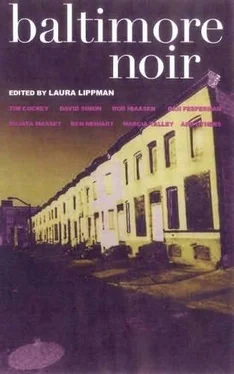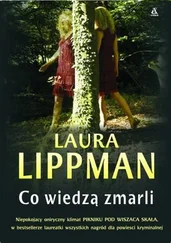Laura Lippman - Baltimore Noir
Здесь есть возможность читать онлайн «Laura Lippman - Baltimore Noir» весь текст электронной книги совершенно бесплатно (целиком полную версию без сокращений). В некоторых случаях можно слушать аудио, скачать через торрент в формате fb2 и присутствует краткое содержание. Жанр: Триллер, на английском языке. Описание произведения, (предисловие) а так же отзывы посетителей доступны на портале библиотеки ЛибКат.
- Название:Baltimore Noir
- Автор:
- Жанр:
- Год:неизвестен
- ISBN:нет данных
- Рейтинг книги:3 / 5. Голосов: 1
-
Избранное:Добавить в избранное
- Отзывы:
-
Ваша оценка:
- 60
- 1
- 2
- 3
- 4
- 5
Baltimore Noir: краткое содержание, описание и аннотация
Предлагаем к чтению аннотацию, описание, краткое содержание или предисловие (зависит от того, что написал сам автор книги «Baltimore Noir»). Если вы не нашли необходимую информацию о книге — напишите в комментариях, мы постараемся отыскать её.
Baltimore Noir — читать онлайн бесплатно полную книгу (весь текст) целиком
Ниже представлен текст книги, разбитый по страницам. Система сохранения места последней прочитанной страницы, позволяет с удобством читать онлайн бесплатно книгу «Baltimore Noir», без необходимости каждый раз заново искать на чём Вы остановились. Поставьте закладку, и сможете в любой момент перейти на страницу, на которой закончили чтение.
Интервал:
Закладка:
“You’ve got to be kidding,” Rie says. She lets go of my arm and makes a pucker-face at me.
The voice goes on: “The male frog embraces the female, holding her tight with his arms. This is the act of oviposition. It may last several days.”
“Oh, come on!” Rie snorts.
The second of the three virtual frogs flies into the air and leaps the entire long length of the pond, like a hurdler showing off. It lands on the opposite shore, bellowing in the direction of a tiny albino toad. Its glistening haunches tremble in the light.
Suddenly, lights mounted in the pond increase in brightness so the water’s utterly translucent. There are hundreds of tadpoles in the water, zipping in circles.
The voice says, “Cell Scope scientists have patented a gene technique that speeds up the frog’s internal clock.”
“That’s enough,” Rie says. She looks out at the audience, in tiers behind us and in a high, quivering voice shouts, “Somebody stop the music!”
There’s some laughter, a lot of shhs and “be quiets.” I’m relieved. The audience is loving Frog Cycle. The way you love a hunt, a dog fight. You’re supposed to yell, Stop! Maybe you’re supposed to yell, Somebody stop the music!
I take Rie’s hand. “This is real,” I tell her. “This is really happening.”
Suddenly I feel warmth. I smell algaeic warm wet air. Breath. Venting on my cheek and down my neck. I look over at Rie, and she shakes her head at me. “It’s not me, asshole,” she says.
I turn and meet its eye. The biggest frog. We’re talking twenty pounds. It’s less than a yard from me, its big bull head pushing against the mesh barrier, wheezing and looking right at me. A string of drool hangs from its lower lip.
I let out a little cry, my feet scrabbling along the floor. The frog roars. The mesh is chinking and clanging and groaning with its weight.
“You’re making it happen,” Rie says. “My brother’s making it happen.” But she lets me hold her hand, so I know we’re safe. I look up the tier; Laurie gives me a quick nod.

We’re in a helicopter out of Martin State. There’s an after-party in Talbot County. I am completely smashed, nearly falling asleep, head bouncing against a window. Over the roar of the engine, I can hear Rie behind me, slurring, giggling. “All I could think of was reproduction,” she’s saying. “I kept looking, against my will, at those hips moving like a piston, spewing that filthy clotted cream. Wasn’t it so terrible? Wasn’t it? That was so disgusting. Every time I close my eyes, I just see it-and I think it should be outlawed. Oh, but maybe I want to see it just one more time.”
For a while, no one speaks. I’m kind of staring out at the purple night clouds and the sparkle of the shoreline in the distance.
Rie makes a little purring noise. I can hear her lips. I guess she’s kissing the guy in the seat next to hers.
“My God, honey,” she says all throat, “my brother made that happen.”
GOODWOOD GARDENS BY SUJATA MASSEY
Roland Park
Jeannie always made it a point to say that the house on Goodwood Gardens had never been her choice. Charlie, however, clung to his belief that their first home in
Baltimore had been a marital compromise. It was an argument without an ending-like their family, and like the house itself.
Goodwood Gardens was not actually a park, as the name suggested, but a short residential road in Plat Four, the fourth portion of land developed in the early twentieth century in Roland Park, a magical neighborhood of curving, tree-shaded streets that boasted grand, century-old houses of stone, stucco, and shingle.
The omission of a word such as “street” or “road” or “avenue” in the Gardens’ address was something Jeannie found maddeningly pretentious, but Goodwood Gardens had been established as the city’s millionaire’s row back at the dawning of the twentieth century, and its identity had held. It didn’t seem like a place that anyone, least of all a girl who’d grown up in a ranch house in San Mateo, should have disliked so heartily.
Jeannie and Charlie’s house had been built in the 1920s, making it one of the newer houses on the street. The residence was huge-ten bedrooms, ten baths, and two powder rooms-more than enough room for a family of three. The place reminded one of an embassy, perhaps located in Salzburg or some other romantic Teutonic locale. The exterior was beautifully half-timbered white stucco, and was ornamented with two battlements from which hung, respectively, the flags of the United States and Maryland.
Jeannie had wanted to remove the flags-the previous owners had left in a hurry, not bothering to take them along-but Charlie thought the neighbors would wonder why. So the flags remained, respectfully illuminated through the night by the klieg-like spotlights that nestled around the house: an excellent security feature, but also another way of showing off the structure, making it look more like a State Department residence than the home of a computer game designer, his three-year-old heir, and the heir’s out-of work, out-of-sorts mother. The only solace, Jeannie thought, was that the house had experienced a succession of seven active owners during the last ten years, so it was completely updated and there were almost no home improvements to be done.
“Just needs a little Restylane,” Hodder Reeves, the real estate broker, had said with an airy wave of his hand the first time he’d walked them through. The house was for sale, but without a sign in front. The house had never needed any signage; the real estate agents knew when it was on the market, and brought select clients registered with their own firm who’d been pre-authorized as having sufficient buying power, and who clearly understood that only offers in the range of two million would be considered.
“A little patch-up on the plaster, here and there, to make things perfect. You’re from California. You know how that stuff’s done,” Hodder had said, winking at Jeannie, who was lingering on the first floor while Charlie was leading their son, Ivanhoe, through the second floor’s maze of interconnecting bedrooms and baths.
Charlie and Jeannie had offered that day, and six months later, as Jeannie weeded the grass underneath the ancient boxwood hedges that now belonged to her, she thought more about Hodder Reeves. He knew the house well, having managed, for the last five go-rounds, to be both the listing and selling agent for it. Six percent of a house like theirs-that appreciated between twenty or thirty percent each time it sold-was practically enough to live on, although Hodder had plenty of other listings in the charmed North Baltimore trifecta of Roland Park, Guilford, and Homeland. Having grown up on Ridgewood Road in a handsome eight-bedroom Greek revival house that backed up to the one next door to Charlie and Jeannie’s, Hodder was a Roland Park boy through and through. His father had founded the region’s largest party services company, which Hodder’s older brother, Stuart, had taken over; Hodder had also mentioned that all the Reeves men had graduated from Gilman, which would be the perfect school for Ivanhoe.
Jeannie couldn’t imagine what a school full of boys would make of a new student called Ivanhoe. Charlie had wanted his firstborn to have a unique name with a historic pedigree. He had suggested Ivanhoe right after birth, when Jeannie was still delirious from mood-altering drugs. When she came to full consciousness and saw the name Charlie had ordered inscribed on the baby’s crib chart, she was upset at first, but once again her husband got what he wanted.
Читать дальшеИнтервал:
Закладка:
Похожие книги на «Baltimore Noir»
Представляем Вашему вниманию похожие книги на «Baltimore Noir» списком для выбора. Мы отобрали схожую по названию и смыслу литературу в надежде предоставить читателям больше вариантов отыскать новые, интересные, ещё непрочитанные произведения.
Обсуждение, отзывы о книге «Baltimore Noir» и просто собственные мнения читателей. Оставьте ваши комментарии, напишите, что Вы думаете о произведении, его смысле или главных героях. Укажите что конкретно понравилось, а что нет, и почему Вы так считаете.












